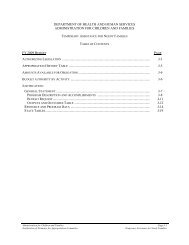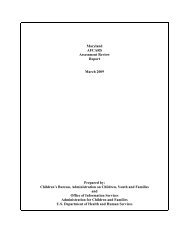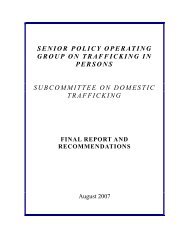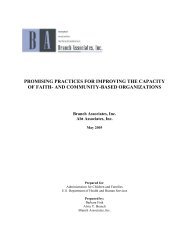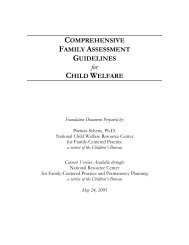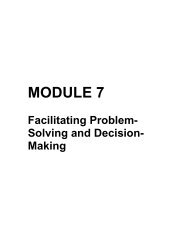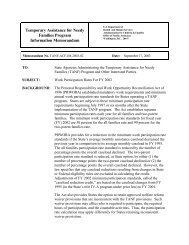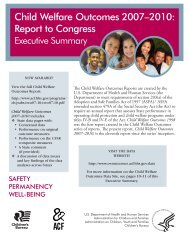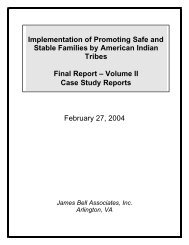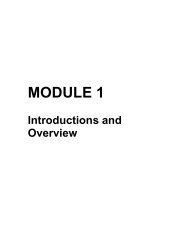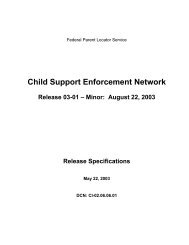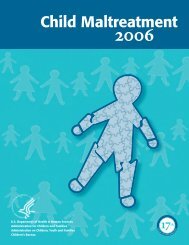Gender Norms and the Role of the Extended Family - Administration ...
Gender Norms and the Role of the Extended Family - Administration ...
Gender Norms and the Role of the Extended Family - Administration ...
Create successful ePaper yourself
Turn your PDF publications into a flip-book with our unique Google optimized e-Paper software.
<strong>Gender</strong> <strong>Norms</strong> <strong>and</strong> <strong>the</strong> <strong>Role</strong> <strong>of</strong> <strong>Extended</strong> <strong>Family</strong><br />
This memo outlines issues raised regarding traditional Hispanic gender roles <strong>and</strong> <strong>the</strong> importance <strong>of</strong> <strong>the</strong><br />
extended family as presented during <strong>the</strong> <strong>Administration</strong> for Children <strong>and</strong> Families Hispanic Healthy<br />
Marriage Research meeting. The findings <strong>and</strong> recommendations in this memo are drawn from<br />
discussions at <strong>the</strong> Supporting Healthy Marriage <strong>and</strong> Hispanic Healthy Marriage Initiative Joint Research<br />
Meeting held on September 12-13, 2005 in Washington, DC <strong>and</strong> a research meeting held in conjunction<br />
with <strong>the</strong> Hispanic Healthy Marriage National Conference May 11, 2006 in San Antonio, TX.<br />
This memo is not intended to be a complete discussion <strong>of</strong> <strong>the</strong>se issues, but ra<strong>the</strong>r to summarize <strong>the</strong><br />
advice received from researchers <strong>and</strong> practitioners in <strong>the</strong> Hispanic community at <strong>the</strong> research meetings<br />
for discussion purposes only.<br />
Introduction<br />
It is important to examine traditional gender roles <strong>and</strong> family systems in different populations to<br />
underst<strong>and</strong> <strong>the</strong>ir impact on couple dynamics. These roles <strong>and</strong> expectations play a significant part in <strong>the</strong><br />
way couples interact, family decision-making, <strong>and</strong> even how one might define marital satisfaction.<br />
Hispanic culture is traditionally associated with distinct gender roles for men <strong>and</strong> women, known as<br />
“machismo” <strong>and</strong> “marianismo,” which dictate certain behavioral expectations for members <strong>of</strong> that<br />
community. In addition, <strong>the</strong>re is a strong emphasis on family <strong>and</strong> community (“familismo”) that<br />
interacts with <strong>the</strong> couple’s expectations <strong>and</strong> decision-making while reinforcing <strong>the</strong> importance <strong>of</strong><br />
cultural <strong>and</strong> societal norms.<br />
These cultural values differ significantly from European/Caucasian norms, which have influenced U.S.<br />
culture, <strong>and</strong> can serve as both a protective factor <strong>and</strong> as a challenge to successful couple relationships.<br />
Curriculum developers <strong>and</strong> program operators need to consider what parts <strong>of</strong> <strong>the</strong>se traditional roles<br />
marriage education programs should try to preserve <strong>and</strong> what parts might be an obstacle to healthy<br />
couple relationships.<br />
What We Know<br />
<strong>Gender</strong> <strong>Role</strong>s<br />
Traditional <strong>and</strong> idealized Hispanic cultural expectations <strong>of</strong> appropriate male <strong>and</strong> female behavior are<br />
<strong>of</strong>ten referred to as machismo or marianismo. Machismo is described as being dominant, virile, <strong>and</strong><br />
independent whereas marianismo emphasizes being submissive, chaste, <strong>and</strong> dependent (Rafaelli <strong>and</strong><br />
Ontai, 2004). Although some research argues that <strong>the</strong>se traditional gender roles are outdated <strong>and</strong><br />
inapplicable, o<strong>the</strong>r studies show that <strong>the</strong>y do influence behavior <strong>and</strong> interaction in Hispanic couples.<br />
For men, <strong>the</strong> cultural emphasis on machismo can translate into a positive outcome where <strong>the</strong> man serves<br />
as provider <strong>and</strong> sacrifices for <strong>the</strong> family or a negative one that emphasizes dominance <strong>and</strong> control. The<br />
positive side <strong>of</strong> this gender expectation is that it encourages men to work hard to provide for <strong>and</strong> protect<br />
<strong>the</strong>ir family. Some research also shows that <strong>the</strong> negative interpretations <strong>of</strong> machismo are less common<br />
than <strong>the</strong> stereotype would indicate. This research argues that Hispanic fa<strong>the</strong>rs are much more nurturing<br />
<strong>and</strong> egalitarian than one might expect, perhaps due to <strong>the</strong> traditional emphasis on familial obligations.<br />
2
Unfortunately, <strong>the</strong> o<strong>the</strong>r side <strong>of</strong> <strong>the</strong>se traditional behaviors is that Hispanic men are <strong>of</strong>ten seen as cold<br />
<strong>and</strong> domineering, due to <strong>the</strong> cultural emphasis on <strong>the</strong>ir economic role in <strong>the</strong> family <strong>and</strong> not on caretaking.<br />
Dr. Roberto Reyes, pr<strong>of</strong>essor <strong>of</strong> Human Development <strong>and</strong> <strong>Family</strong> Science at Messiah College<br />
discussed this issue fur<strong>the</strong>r. Dr. Reyes indicated that some research has shown that when men face<br />
difficulties finding employment <strong>and</strong> are unable to “live up to” <strong>the</strong>ir perceived role in <strong>the</strong> family <strong>the</strong>y<br />
have increased self doubt which manifests as withdrawal from <strong>the</strong> family unit. Some research claims<br />
that when Latino men cannot define <strong>the</strong>mselves in a positive, productive way in society <strong>the</strong>y will define<br />
<strong>the</strong>mselves in more negative, possibly stereotypical gender identity (drinking, aggression, etc.). What's<br />
more, men may feel justified in engaging in destructive behaviors such as infidelity or substance abuse<br />
as long as <strong>the</strong>y are fulfilling <strong>the</strong>ir cultural obligations to provide for <strong>the</strong>ir family economically.<br />
The primary role emphasized for women in Hispanic tradition is that <strong>of</strong> mo<strong>the</strong>r instead <strong>of</strong> wife. The<br />
cultural construct <strong>of</strong> “familismo” is defined as “an emphasis on family relationships <strong>and</strong> a strong value<br />
placed on childbearing as an integral part <strong>of</strong> family life <strong>and</strong> <strong>the</strong> feminine gender role” (Rafaelli <strong>and</strong><br />
Ontai, 2004). This leads women to define <strong>the</strong>mselves through <strong>the</strong>ir family <strong>and</strong> children instead <strong>of</strong><br />
independently or as part <strong>of</strong> a couple. The role <strong>of</strong> martyr is also idealized, with women expected to be<br />
submissive <strong>and</strong> sacrifice <strong>the</strong>mselves for <strong>the</strong>ir families. For marriage education providers, this stereotype<br />
provides both an opportunity <strong>and</strong> a challenge. It means that women will be extremely dedicated to <strong>the</strong>ir<br />
families <strong>and</strong> <strong>the</strong> good <strong>of</strong> <strong>the</strong>ir children, which can be a powerful motivator for participating in marriage<br />
education workshops. However, women may see <strong>the</strong>mselves as a mo<strong>the</strong>r first <strong>and</strong> place <strong>the</strong> couple<br />
relationship at a lower priority. In many cases, <strong>the</strong> idea <strong>of</strong> “parenthood” is valued over “partnerhood.”<br />
In addition, <strong>the</strong> emphasis on <strong>the</strong> wife’s quiet submission <strong>and</strong> <strong>the</strong> husb<strong>and</strong>’s dominance <strong>and</strong><br />
independence may make it more difficult for Hispanic women to communicate directly <strong>and</strong> assertively<br />
with <strong>the</strong>ir husb<strong>and</strong>s.<br />
Although Hispanic couples immigrating to <strong>the</strong> United States may acculturate away from traditional<br />
behaviors, it is important to recognize that <strong>the</strong>se cultural expectations can still hold. Fur<strong>the</strong>rmore, <strong>the</strong><br />
definition <strong>of</strong> a “good” relationship can vary dramatically across culture, country <strong>of</strong> origin, <strong>and</strong> level <strong>of</strong><br />
acculturation. For example, some couples that are less acculturated may not view egalitarianism as an<br />
important part <strong>of</strong> a healthy relationship. It is also necessary to remember that different members <strong>of</strong> a<br />
couple may acculturate at different rates, particularly with regards to <strong>the</strong>se traditional gender roles. For<br />
example, men <strong>of</strong>ten tend to acculturate more quickly than <strong>the</strong>ir wives because <strong>the</strong>y <strong>of</strong>ten arrive in <strong>the</strong><br />
United States before <strong>the</strong> rest <strong>of</strong> <strong>the</strong> family <strong>and</strong> have more exposure to mainstream culture through <strong>the</strong><br />
workplace. However, shifting gender roles may have a more pronounced effect for Hispanic women<br />
than for men due to <strong>the</strong> greater difference between expectations for <strong>the</strong>ir behavior in <strong>the</strong> Hispanic<br />
community <strong>and</strong> mainstream culture. Marriage educators should be aware that different levels <strong>of</strong><br />
acculturation are correlated with increased marital conflict as expectations <strong>and</strong> behaviors change.<br />
Lastly, a stereotype does exist that more conservative gender roles such as those described above can<br />
lead to increased domestic violence in <strong>the</strong> Hispanic community. In fact, traditional Hispanic gender<br />
roles can be both oppressive <strong>and</strong> protective when it comes to domestic violence. The woman’s role as<br />
sacrificing <strong>and</strong> subservient can lead to greater tolerance <strong>of</strong> domestic violence, as can <strong>the</strong> strong<br />
commitment to <strong>the</strong> family <strong>and</strong> <strong>the</strong> institution <strong>of</strong> marriage. The view <strong>of</strong> men as <strong>the</strong> dominant decisionmakers<br />
can also encourage controlling behaviors. Lastly, because <strong>of</strong> <strong>the</strong>ir role in <strong>the</strong> home, Hispanic<br />
3
women are <strong>of</strong>ten economically dependent on men, making it more difficult to leave <strong>the</strong> relationship.<br />
However, although <strong>the</strong>se more dangerous facets <strong>of</strong> traditional gender roles can encourage domestic<br />
violence, Hispanic men who embrace <strong>the</strong> positive side <strong>of</strong> machismo might be less likely to be violent.<br />
These values instruct men to protect <strong>the</strong>ir families, including <strong>the</strong>ir wives, which is incompatible with a<br />
domestic violence scenario.<br />
<strong>Extended</strong> <strong>Family</strong><br />
Ano<strong>the</strong>r strong cultural value in <strong>the</strong> Hispanic community is that <strong>of</strong> familismo, which was defined above<br />
as “an emphasis on family relationships <strong>and</strong> a strong value placed on childbearing as an integral part <strong>of</strong><br />
family life <strong>and</strong> <strong>the</strong> feminine gender role.” This includes a strong emphasis on family obligation, <strong>the</strong><br />
value <strong>of</strong> children <strong>and</strong> community <strong>and</strong> <strong>the</strong> importance <strong>of</strong> past <strong>and</strong> future generations. These values <strong>of</strong>ten<br />
play out in couples’ priorities <strong>and</strong> decision-making. The boundaries between what are couple issues <strong>and</strong><br />
what is a family or community issue is <strong>of</strong>ten blurred. As with <strong>the</strong> cultural expectations described above<br />
with respect to gender roles, <strong>the</strong> traditional emphasis on familismo can be protective or it can pose a<br />
challenge to <strong>the</strong> couples <strong>the</strong>mselves <strong>and</strong> to marriage educators.<br />
Familismo can streng<strong>the</strong>n a couple’s relationship with some <strong>of</strong> <strong>the</strong> positive associations it brings. The<br />
importance <strong>of</strong> extended family provides couples with an extensive social support network that can assist<br />
<strong>the</strong>m in times <strong>of</strong> emotional or economic difficulty. In addition, <strong>the</strong> emphasis on stability <strong>and</strong> community<br />
means that <strong>the</strong> importance <strong>of</strong> <strong>the</strong> couple’s relationship is validated <strong>and</strong> supported by <strong>the</strong> extended<br />
family. Dr. Rol<strong>and</strong>o Díaz-Loving, head <strong>of</strong> <strong>the</strong> Psychosocial Research Unit at <strong>the</strong> National Autonomous<br />
University <strong>of</strong> Mexico, explained that this support network need not come exclusively from blood<br />
relatives. In many instances, <strong>the</strong> process <strong>of</strong> migration <strong>and</strong> immigration may leave couples isolated from<br />
extended family, <strong>and</strong> support networks are created with o<strong>the</strong>rs in <strong>the</strong> community. “Compadres” <strong>and</strong><br />
“god-parents” may be viewed as part <strong>of</strong> <strong>the</strong> family, <strong>and</strong> <strong>the</strong>ir influence on <strong>the</strong> couple’s relationship is<br />
seen as just as important.<br />
A strong sense <strong>of</strong> familismo may actually encourage a couple to participate in a given program. If a<br />
couple is convinced that marriage education is <strong>the</strong> best thing to do for <strong>the</strong>ir family, this obligation can be<br />
used to motivate <strong>the</strong>ir attendance <strong>and</strong> engagement in <strong>the</strong> program. For example, couples may choose to<br />
attend a marriage education program if <strong>the</strong>y’re convinced that it’s <strong>the</strong> best thing <strong>the</strong>y can do for <strong>the</strong>ir<br />
children.<br />
While <strong>the</strong> involvement <strong>of</strong> extended family in <strong>the</strong> lives <strong>of</strong> Hispanic couples can help support <strong>and</strong> validate<br />
<strong>the</strong>ir relationships <strong>and</strong> families, this also means that marriage educators must deal with <strong>the</strong> challenge <strong>of</strong><br />
extended family being involved in decision-making. The extended family <strong>and</strong> generational differences<br />
associated with length <strong>of</strong> time in <strong>the</strong> United States can be a stressor in Hispanic families. Child-rearing,<br />
for example, may be considered <strong>the</strong> couple’s domain in mainstream culture but is considered a family<br />
affair in <strong>the</strong> Hispanic community. This can cause conflict particularly when <strong>the</strong> couple is more or less<br />
acculturated than older generations. In addition, children can be exposed to differing values <strong>and</strong><br />
behaviors than those <strong>of</strong> <strong>the</strong>ir parents because <strong>of</strong> time spent with extended family.<br />
Some couples may be dealing with a recent separation from <strong>the</strong>ir extended family <strong>and</strong> social network,<br />
particularly those who are recent immigrants. Technology can help mitigate this separation by keeping<br />
4
immigrants informed <strong>of</strong> what is happening in <strong>the</strong>ir countries <strong>of</strong> origin, but <strong>the</strong> elimination <strong>of</strong> a valuable<br />
support network can be extremely difficult for couples to deal with. O<strong>the</strong>r factors, such as substance<br />
abuse <strong>and</strong> incarceration, can also sever extended family ties. Regardless <strong>of</strong> <strong>the</strong> cause for separation<br />
from extended family members, marriage educators should be aware <strong>of</strong> <strong>the</strong> impact this may have on <strong>the</strong><br />
couple relationship.<br />
What Do We Still Need to Know<br />
<strong>Gender</strong> <strong>Role</strong>s<br />
Traditional gender roles in <strong>the</strong> Hispanic community are well-defined, <strong>and</strong> <strong>the</strong>re is some research on how<br />
closely <strong>the</strong>y reflect actual behavior. However, <strong>the</strong>re is much that is unknown about how <strong>the</strong>se<br />
expectations play out for couples, particularly immigrants to <strong>the</strong> United States. There is little conclusive<br />
information about how closely traditional gender roles apply, particularly when some literature<br />
emphasizes <strong>the</strong> importance <strong>of</strong> machismo <strong>and</strong> marianismo whereas o<strong>the</strong>rs, such as <strong>the</strong> parenting<br />
literature, seem to contradict <strong>the</strong>se expectations. There are even some who question whe<strong>the</strong>r machismo<br />
<strong>and</strong> <strong>the</strong> patriarchal system even exist in Hispanic families. Dr. Luis Zayas, pr<strong>of</strong>essor <strong>of</strong> Social Work<br />
<strong>and</strong> Psychiatry at <strong>the</strong> Washington University School <strong>of</strong> Medicine illustrated this point by stating that<br />
many view <strong>the</strong> mo<strong>the</strong>r as being <strong>the</strong> most significant member <strong>of</strong> <strong>the</strong> family <strong>and</strong> <strong>of</strong>fending or<br />
disappointing her is most influential in determining behavior.<br />
Fur<strong>the</strong>rmore, it is unclear how gender roles are affected by immigration to <strong>the</strong> United States <strong>and</strong><br />
acculturation to mainstream norms <strong>and</strong> expectations. There is a contradiction between <strong>the</strong> hypo<strong>the</strong>sis<br />
that acculturation would deconstruct traditional gender norms <strong>and</strong> <strong>the</strong> assertion in some literature that<br />
even highly acculturated couples can still exhibit very traditional roles <strong>and</strong> behaviors. In addition, it<br />
would be helpful to investigate what behaviors <strong>and</strong> norms expressed as part <strong>of</strong> traditional cultural gender<br />
roles help protect couples. Marriage education programs would do well to preserve <strong>the</strong>se behaviors.<br />
Lastly, as was emphasized throughout <strong>the</strong> discussion, although <strong>the</strong>re are some commonalities among <strong>the</strong><br />
Hispanic community, <strong>the</strong>re are also a range <strong>of</strong> differences based on country <strong>of</strong> origin, class, <strong>and</strong> degree<br />
<strong>of</strong> acculturation. More detailed research is needed to determine what <strong>the</strong>se similarities <strong>and</strong> differences<br />
are.<br />
<strong>Extended</strong> <strong>Family</strong><br />
Two particular questions were raised with regards to <strong>the</strong> interaction <strong>of</strong> extended family networks with<br />
couple dynamics. First, what effect might intervening at <strong>the</strong> couple level have on o<strong>the</strong>r parts <strong>of</strong> <strong>the</strong><br />
family system? It is possible that a marriage education intervention, for example, that questions certain<br />
cultural norms might cause conflict between generations. A better underst<strong>and</strong>ing <strong>of</strong> generational<br />
differences <strong>and</strong> family systems can help curriculum developers create culturally appropriate tools for<br />
couples.<br />
Second, what is <strong>the</strong> effect <strong>of</strong> immigration <strong>and</strong> acculturation on social support? One hypo<strong>the</strong>sis is that<br />
couples are forced into social isolation after immigrating because <strong>the</strong>y have less access to traditional<br />
family support networks. However, ano<strong>the</strong>r possibility is that couples replace traditional social supports<br />
with new friends <strong>and</strong> jobs as <strong>the</strong>y assimilate into <strong>the</strong> mainstream culture. If this transition does occur, it<br />
may not happen equally for both members <strong>of</strong> <strong>the</strong> couple. For example, a husb<strong>and</strong> might replace lost<br />
5
social supports more quickly because <strong>of</strong> his integration into <strong>the</strong> workplace. This may leave his wife<br />
feeling disconnected from her partner in addition to losing her traditional support system. How does this<br />
aspect <strong>of</strong> differential acculturation affect couple dynamics?<br />
What Should We Do With What We Know?<br />
This section <strong>of</strong> <strong>the</strong> memo will draw recommendations from <strong>the</strong> advice <strong>of</strong> expert researchers <strong>and</strong><br />
practitioners in <strong>the</strong> Hispanic community. Some <strong>of</strong> <strong>the</strong>ir recommendations are applicable not just to<br />
those programs working with a Hispanic population. They have been organized by those that are more<br />
generally applicable <strong>and</strong> those that will be particularly helpful in primarily Hispanic programs.<br />
However, it is important to note that even those recommendations targeted toward Hispanic populations<br />
will not apply equally to all Hispanic families, due to cultural variations between different countries <strong>of</strong><br />
origin, degree <strong>of</strong> acculturation, <strong>and</strong> particular families.<br />
General Recommendations<br />
• Marriage education programs should not try to define what a “good” relationship is. Program<br />
developers should include couples in program design to be sure that opposing values are not<br />
being imposed, <strong>and</strong> facilitators should allow <strong>the</strong> definition <strong>of</strong> a “good” relationship to come from<br />
<strong>the</strong> couples. This applies to every couple, not just Hispanic populations. A huge variety <strong>of</strong><br />
factors can affect how someone defines a “good” relationship, such as family <strong>of</strong> origin, culture,<br />
age, economic status, <strong>and</strong> many more.<br />
• Recognize how couples are oriented within <strong>the</strong>ir family system <strong>and</strong> how o<strong>the</strong>r members <strong>of</strong> <strong>the</strong><br />
family affect <strong>the</strong> couple’s decision-making. Discuss ways in which <strong>the</strong> family supports <strong>the</strong>m <strong>and</strong><br />
issues that may also contribute to conflict in <strong>the</strong> couple.<br />
• Programs can use children <strong>and</strong> parenting as a motivator for participation. This may be especially<br />
effective for Hispanics, given <strong>the</strong> emphasis on family responsibility <strong>and</strong> community. However,<br />
all parents may be motivated to participate by what’s best for <strong>the</strong>ir children.<br />
• All couples will have some traditions <strong>and</strong> cultural expectations that <strong>the</strong>y bring with <strong>the</strong>m into<br />
<strong>the</strong>ir marriage. Programs can help couples identify <strong>the</strong>ir relationship dynamics <strong>and</strong> what causes<br />
<strong>the</strong>m <strong>and</strong> allow <strong>the</strong>m to decide what traditions <strong>and</strong> norms <strong>the</strong>y want to keep. For Hispanic<br />
couples, this might mean choosing to remain connected to extended family while also identifying<br />
certain areas <strong>of</strong> decision-making that belong to <strong>the</strong> couple.<br />
Recommendations for Hispanic Populations<br />
• It may be more effective for program operators to emphasize what’s best for <strong>the</strong> family <strong>and</strong><br />
children when trying to recruit Hispanic couples. This message may resonate more than <strong>the</strong><br />
importance <strong>of</strong> <strong>the</strong> couple relationship, due to <strong>the</strong> traditional role <strong>of</strong> women as mo<strong>the</strong>rs <strong>and</strong> <strong>the</strong><br />
cultural prominence <strong>of</strong> familismo.<br />
6
• Program operators can try to engage Hispanic men by talking about <strong>the</strong>ir dual position as fa<strong>the</strong>rs<br />
<strong>and</strong> sons. As fa<strong>the</strong>rs, <strong>the</strong>y have a cultural obligation to provide a safe <strong>and</strong> stable environment for<br />
<strong>the</strong>ir children. As sons, <strong>the</strong>ir strong connection to older generations emphasizes making <strong>the</strong>ir<br />
family proud <strong>and</strong> honoring <strong>the</strong>ir parents’ sacrifices by doing what’s best for <strong>the</strong>ir family <strong>and</strong><br />
community.<br />
• Curriculum developers should consider whe<strong>the</strong>r certain types <strong>of</strong> verbal communication are<br />
appropriate or helpful, given <strong>the</strong> traditional gender roles sometimes at play in Hispanic couples’<br />
dynamics. For example, Hispanic women may have difficulty in directly communicating <strong>the</strong>ir<br />
personal needs because <strong>of</strong> <strong>the</strong> cultural emphasis on sacrifice <strong>and</strong> martyrdom. Curriculum<br />
developers should recognize that some communication skills <strong>and</strong> exercises may be more<br />
challenging for Hispanic couples due to <strong>the</strong>se traditional norms.<br />
• Curriculum developers may want to pay special attention to challenges that particularly affect<br />
Hispanic couples in <strong>the</strong> areas <strong>of</strong> negotiating gender roles <strong>and</strong> extended family networks,<br />
including: shifting gender norms resulting from acculturation; lack <strong>of</strong> social support due to<br />
isolation from extended family networks; cultural forms that tolerate domestic violence; <strong>and</strong> <strong>the</strong><br />
role <strong>of</strong> extended family in decision-making.<br />
7
References<br />
Raffaelli, M. <strong>and</strong> L.L. Ontai. 2004. “<strong>Gender</strong> socialization in Latino/a families: Results from two<br />
retrospective studies.” Sex <strong>Role</strong>s: A Journal <strong>of</strong> Research, 50: 287-299.<br />
Expert participants from <strong>the</strong> Supporting Healthy Marriage <strong>and</strong> Hispanic Healthy Marriage Initiative<br />
Joint Research Meeting held on September 12-13, 2005 in Washington, DC, <strong>and</strong> a research meeting held<br />
in conjunction with <strong>the</strong> Hispanic Healthy Marriage National Conference May 11, 2006 in San Antonio,<br />
TX.<br />
8



